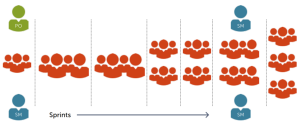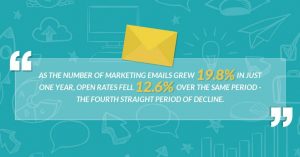As many of you well know, SEO is something that is frowned upon by a lot of people and on the whole it’s something that is referred to as a “dark art” by many. While many a year ago this may have held some truth, nowadays, SEO is light-years away from what it once was.
The Future…
Big is a rather broad term so to be a bit more precise, we asked a number of different people in the SEO world as to what changes, updates and new releases they think will be prominent within the next 12 months.
The things that were covered range far and wide from semantic search and algorithm changes to social signals and the continuous Penguin update, these guys have gone the whole hog but first, here are the thoughts of BrightRED HQ’s very own Digital Marketing Specialist…
Jake Oates
Twitter – @Jakeoate5
Website – brightred.digital
Mobile is massive. That’s a fairly obvious statement but due to the popularity of mobile and the rate at which is has grown in 2014, we think that apps will become more prominent in the SERPs and that a lot more data will be indexed by Google.
Recently we read about a patent submission from Google. This makes us think that due to the widespread misuse of links and the “black hat” tactics employed by many, Google will start to look at other ways of ranking a site instead of just using links; brand mentions and citations.
Stephen Kenwright
Stephen is Head of Search at Leeds and London based Branded3.
Twitter – @stekenwright
Website – www.branded3.com
“Google has just announced that Penguin will roll out continuously, like Panda. I think this is really just conceding defeat in the war on link spam. Hopefully this will mean we’ll see a lot more manual actions handed out, but I think it’s more likely that bad backlinks just won’t be a big issue anymore.
I don’t think many people do really bad link building nowadays so there will be the odd big brand made an example of.
I think we’ll see Pigeon rolling out in the UK and a greater emphasis on local search. The US is ahead of us in this respect and it’s time we caught up. The infrastructure is there so we won’t be far off Google flicking the switch.
Lastly from an agency perspective I think we will see greater integration between the big media agencies and their SEO teams. We see them performing very separately at the minute and I don’t think it will be long before some more big players move into search, especially since many companies like M&C Saatchi have already made the investment in search agencies and so far have just failed to integrate them properly.”
Josh Bachynski
Josh is an SEO and he writes for a lot of different websites including his own which you can find below.
Twitter – @joshbachynski
Website – themoralconcept.net
“In 2015 and moving forward the biggest issue for websites will be quality signals. Quality is a subjective term. Thus it is VITAL for publishers to fall inline with what Google thinks quality is, and their opinion does not always match with the rest of us.
Use my list here http://themoralconcept.net/pandalist.html of curated actual Google leaks as to what specifics they dictate to be of quality, or not. Or get left behind.”
Martin Mulvey
Martin is Digital Marketing Manager at a Preston based Digital agency called We Are Blush.
Twitter – @weare_blush & @m88ulv
Website – weareblush.co.uk
“Google’s users want the correct answers to their queries, not an answer that may or may not be relevant through a website with a lot of forced or purchased links or over-use of SEO tactics.
We believe that in 2015, Google will increase the emphasis on quality content and decrease the value of links to make the search results more natural and less manipulatable.
Although these are not new groundbreaking foresights, Google are going about it the right way, as all that matters is that the person doing the search, ends up where they want to be; on a fully-functioning website with the relevant information. How sharable an article is, generally shows that the article is relevant or interesting, therefore, the use of social media in terms of sharing should have more of an impact in the coming year.”
Cyrus Shepard
Most of you reading this will probably know Cyrus from MOZ.
Twitter – @CyrusShepard
Website – moz.com/CyrusShepard
“2015 looks to be an exciting year for search marketing for those willing to make the investment. The fundamentals of SEO likely won’t change significantly, but for those wishing to stay on top of things I’ll put forth three predictions I believe worth paying attention to.
First of all, with Google introducing “mobile-friendly” labels in search results, I would expect Google to introduce mobile-specific ranking factors in the near future. This may involve boosting mobile friendly sites in mobile results, or even lowering the visibility of sites across the board that don’t deliver good multi-platform experiences. Second, instead of waiting over a year between Penguin updates, we’ll see Google incorporate more continuous “rolling” updates – much like we’ve seen with the long rollout of Penguin 3. If would be a great development for webmasters who can’t wait a year for recovery.
Finally, I believe Google will face more regulatory pressure, both in Europe and the US, as regulators make claims of Google abusing it’s dominate market position. Whether this would benefit marketers remains to be seen, but most regulatory efforts in Europe to reign in Google have mostly been disastrous to both governments and publishers alike.”
Patrick Hathaway
Patrick is a Director at URL Profiler and is also an SEO Consultant at Hit Reach, a web design and SEO agency.
Twitter – @hathawayp
Website – urlprofiler.com
“I think the biggest change that will impact the SEO industry in 2015 has just been announced – Google’s shift to update Penguin continuously. This will make any kind of “traffic drop audit” much more difficult – with both Panda and Penguin now updating unannounced and potentially overlapping, determining the cause for any kind of traffic drop will be much less clear-cut.
In order to remain in safe waters, I think we will need to become more proactive and nip any potential issues in the bud. This means actively monitoring incoming links and proactively disavowing/removing the bad ones, as well as regularly auditing site content to look for potential Panda triggers (thin/duplicate pages and pages with poor engagement metrics). Regularly collecting and storing SEO data about you site and niche will hopefully become common practice, as you’re going to need it if you do come up against a penalty situation.
“Where search is going” is becoming increasingly synonymous with “what Google are doing”. I recently made the case that SEOs need to focus on the user experience of Google’s users, as ultimately this is how Google is judging your content – is your site a good fit for their users? I think we’ll see this trend increase, and more specifically, I think we’ll see the increasing impact that mobile performance will have on search results. If your site offers a particularly poor experience on mobile, you may start to see drops for both desktop and mobile SERPs. Google have made it clear they are looking to offer a unified experience across all devices, so it stands to reason that this will also ultimately include the SERPs themselves.”
Rick Walker
Rick is an Online Marketing Executive at Begbies Traynor, based in both Manchester and Preston; though he’s not in both places at the same time.
Twitter – @rwalkerseo
“As we have seen over the years Google has got much smarter with user experience. People typing in long tail search term such as “good local hairdresser for men” will show the same SERP results as “mens hairdressers”.
Good keyword research will be vital in 2015 but don’t complicate things remember what users actually need and give them what they want.
2015 will also be about making sure you have a perfectly optimised site. Technical issues such as site structure, crawl errors and page load speed need to be nailed to a tee in order to get the most out of your online marketing campaign.”
Bill Sebald
Bill is the owner of Greenlane SEO. Writes for MOZ and Search Engine Journal to name but a few.
Twitter – @billsebald
Website – greenlaneseo.com
“I think what Google has started with entities, semantic search and the knowledge graph has so much potential, but I’m honestly surprised how slow the execution has actually been.
There have been great studies done to show the results of Hummingbird but very few to show the knowledge graph’s impact on rankings based on relationships. I have to hope 2015 will be the year, but it doesn’t appear to be a big priority. I do also hope they reconstruct Google My Business again. That thing is still a mess. Kind of like the Spiderman movie franchise.
What I think will most likely happen are more Pandas and Penguins, and less webspam. Seeing the big step they’re taking with usability as a ranking signal in mobile, it’s probably a safer bet it’ll come to desktop in 2015 – in a light, entry-level fashion.”
Wil Reynolds
Wil is the founder of SEER Interactive and to quote his Twitter bio, he does “SEO, marketing and stuff.”
Twitter – @wilreynolds
Website – seerinteractive.com
“I’d say that in the next 12 months I am hoping to see some kind of social impact brought into the Google algo.
I am hedging on personalization coming, and I hope its sooner than later. When I see the facebook + tripadvisor integration, I can not help but think, wow I wish that happened more all over the web.
Recommendations from people we know will often be more trusted than an algorithmic ranking.”
Rick Talbot
Rick is a Digital Marketing Specialist living in the South having abandoned Preston to join Totally Communications in early 2014.
Twitter – @rtalbot55
Website – totallycommunications.com
“2015 – The Year of Mobile.
Rick’s main tip to SEOs is that meta descriptions DO affect your rankings. The number of times a results gets clicked in a SERP will change it’s position – so make that description irresistible.
A follow on to this tip is to regularly analyse your server logs; negative SEO is no longer just about buying 5000 SAPE links – bots that mimic user behaviour are becoming more common place – look for unusual patterns that may suggest foul play (start here).
Oh… and data, get that stuff analysed, create a story.”
Kevin Gibbons
Kevin is the director of BlueGlass, a strategy-driven digital marketing agency based in London.
Twitter – @kevgibbo
Website – blueglass.co.uk
“I wrote a post recently about where I see SEO heading in 2015, the key focus being around the huge increase in mobile usage. We’re now seeing mobile exceed desktop for a number of clients this year – if mobile isn’t being taken seriously yet, where have you been!
An interesting development to follow will be in the future growth into wearable tech and how we market through notifications – innovating our marketing based upon where the audience is likely to be and the devices they are using is always important to keep track of.
Yet, the biggest mistake I still seeing made in digital is within the marketers mindset. I still see a clear need to remove the fear of failure and look to build campaigns where you start to take a few risks with your content. The riskiest thing you can ever do in my opinion is to follow the crowd – once you step into the unknown you’ll truly start to experience the benefits.”
Ann Smarty
Ann is a blogger and Brand Manager at Internet Marketing Ninjas and is also the founder of MyBlogU and Viral Content Buzz.
Twitter – @seosmarty
Website – viralcontentbuzz.com
“Here’s what I think were the most important 2014 search trends which are going to matter a lot in 2015…
Penguin, as well as earlier Panda, is part of the algorithm. This is a good thing because web publishers won’t have to wait for a recovery for months. On the other hand, the two will be much harder to diagnose (previously we could be pretty sure if the traffic drop was a Penguin Update because we had the list of confirmed Penguin dates).
Knowledge Graph is getting smarter. Google wants to know entities and how they relate to each other. “Things instead of string” is the biggest news for optimizers: Knowing keywords is no longer enough! Keywords are getting less useful also because there is no good way to track rankings (due to multiple facts including non-provided, personalized results, etc).
Google wants to monetize a mobile user better. Mobile experience and experiments will be a bigger trend in 2015. Google is not giving up on links as the major ranking factor (so no end to link building/removing hell so far!) but they are desperately looking for more signals. SEOs will experiment to fake those and discover more newer vulnerabilities (This has already started). That will be fun to watch :).”
Adrian Berry
Adrian is Search Manager at a Preston based agency called every1.
Twitter – @ady_berry
Website – helloevery1.com
“Search will become highly user focused… While 2014 has been the year of content marketing, I believe that 2015 will see more digital marketers and SEO companies properly utilising techniques like Persona Development and User Experience, as well as paying more attention to usability and user-centred design.
Google’s reluctance to give out data, coupled with the growth of personalisation and mobile, means that traditional SEO gets much less information to work with. Utilising personas and UX allows us to understand the types of user and the content that matters to them. Here at every1 we’ve successfully integrated these ideas into our design, development and search marketing processes to identify the different types of visitors and how they are interacting with client websites, in order to deliver effective user experiences.
Adopting this approach is very good news for business as it helps create on-page and off page content that connects with and engages visitors, and which converts at a much higher rate. Creating great content, served to the right people at the right time will ultimately help deliver for brands and organisations looking to improve their search marketing in 2015 and beyond.”
Bill Slawski
Bill is the president and founder of SEO by the Sea and he has been involved in professional SEO and internet marketing consulting since 1996.
Twitter – @bill_slawski
Website – www.seobythesea.com
“In 2015, Google has made it clear that they will be showing increased amounts of semantic search results that contain features such as knowledge panels (that often contain advertisements) and carousels, They’ve also be showing interesting newer answer box type results for things such as TV Episodes, songs and more. Microsoft has also been adding ways to search knowledge base results from places such as ms-office, which makes it a much more interesting product.
Wikidata is replacing Freebase at Google, and rumors are that it will have an interesting API that could help content creators display more interesting and meaningful information on their pages. If you weren’t using the Freebase API to find entities related to those on your pages, in the past, consider the Wikidata API to be a second chance to find information like that.
A Google patent granted this past September includes an onsite rank combined with a global rank that takes into account things such as information architecture, the placement of individual pages within a site’s structure, the topics that links seem to focus upon, a hubs and authorities approach to how pages handle authority, and more. It’s possible that an approach like this one may be Google’s replacement for PageRank – the year 2015 will tell. Even if it isn’t, it provides some useful approaches to site quality that could help to make sites less likely to be subject to chances through sources such as Google’s Panda Updates.”
Nick Boyle
Nick is Search Manager at Bolton based Digital Marketing Agency, Bring Digital.
Twitter – @Bring_NickB
Website – www.bringdigital.co.uk
“Semantics is becoming a huge part of content planning and creation, and with search results moving even more towards matching the intent of the searcher, rather than just the keyword phrase they input, it’s time for content managers to look at their processes. Creating content strictly for the user… and almost ignoring that the search engine exists for a moment can be a fruitful approach. Most content managers will be doing this, but if they aren’t, it’s time to ‘get semantic’ with their teams.
Looking at things from a wider perspective, it’s clear that SEO isn’t just SEO anymore. Every single thing we do in business can and will impact our SEO performance. The conversations we have in the pub all the way up to the PR campaigns we launch all directly and indirectly impact performance. Attributing success on the back of this to SEO can sometimes be tricky, but adopting the right approach in Analytics can serve up some fantastic insight.”
It’s a Wrap!
So, there we have it. The thoughts of 13 people in the SEO and digital marketing world, some of whom you may know of, others you may not.
What are your thoughts on the insights that we have gotten above? We’d love to hear more from you in the comments!
Don’t forget, you can follow us on Twitter too. Happy SEO in 2015!
This post was originally posted on BrightRED Digital’s website here
(963)
Report Post








